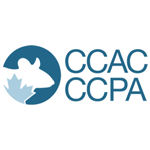Information Box Group

Canadian Council on Animal Care (CCAC) CCAC Guidelines
The Canadian Council on Animal Care (CCAC) is a national peer-review agency responsible for setting and maintaining standards for the care and use of animals in research and testing across Canada.
Created in 1968, the CCAC is an independent, non-profit organization, acting in the interests of the Canadian people. More than 2,000 volunteer experts serving on more than 190 local animal care committees (ACCs) help fulfill CCACs mandate and deliver our program in institutions across Canada. Also comprised of volunteer experts, the CCAC Governing Board of Directors is nominated and elected by CCAC’s 23 member organizations, which reflect a wide range of interests, concerns and objectives surrounding animal-based science in Canada.
The CCAC is financed primarily by the Canadian Institutes of Health Research (CIHR) and the Natural Sciences and Engineering Research Council of Canada (NSERC), with additional contributions from annual program participation fees paid by CCAC-certified institutions. This means that institutions receiving funding from CIHR and NSERC must comply with CCAC guidelines.
Every three years, the CCAC conducts an on-site assessment. This panel visits all research facilities that house animals or where animals are moved to. Non-compliance with the CCAC guidelines can result in loss of funding from the major granting agencies and probation of the animal use program.

Ontario Ministry of Agriculture, Food and Rural Affairs (OMAFRA) Animals for Research Act
The Ontario Ministry of Agriculture, Food and Rural Affairs (OMAFRA) provides provincial oversight for the welfare of animals, including animals used in research. Ontario is one of the few provinces that has both national and provincial oversight. The Chief Veterinary Inspector enforces the provincial legislations covered under the Animals for Research Act and conducts unannounced inspections.
Among other items, the inspector checks the health of the animals, caging, environment and ensures only approved procedures are being performed. Most importantly, the inspector issues McMaster a license to operate our entire animal research program. If the institution does not comply with the recommendations, the institution’s research license can be suspended or revoked.

McMaster University Animal Research Ethics Board (AREB) AUPs and regulatory information
The Animals for Research Ethics Board (AREB) is McMaster University’s presidentially appointed Animal Care Committee. The members on this committee include, at minimum, the chair of the committee, the university veterinarian, an animal research ethics officer, principal investigators, an animal facility animal technician, the animal research compliance officer, students involved in research, at least one community representative and representatives from the Faculty of Health Sciences, Biosafety and the Safety Office.
Among other duties, AREB reviews all research Animal Utilization Protocols (AUPs), Amendments, Annual Reviews and Pilot Studies conducted at the McMaster Animal Facilities. The committee is also responsible for conducting yearly audits on labs outside of the animal facilities where animals move to. They are also responsible for Post Approval Monitoring, such as observations of procedures. The purpose of AREB is to ensure that animal pain and distress are minimized in all research protocols. As a user of animals, you must be added to your investigator’s AUP and have reviewed and become familiar with the document.
